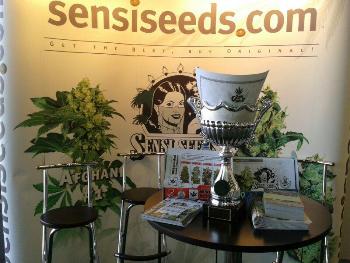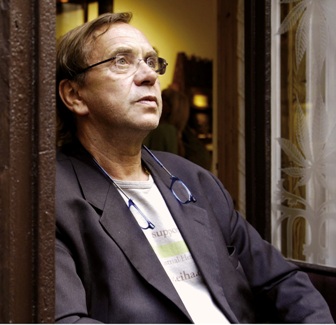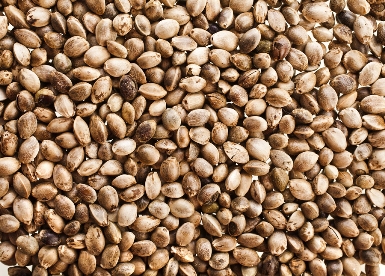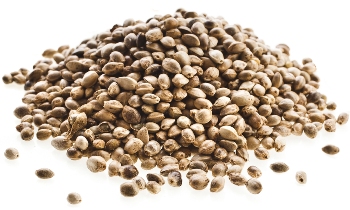Even with prohibition seemingly coming to an end, persecution of the fledgling marijuana industry has forced difficult decisions upon those who have worked to overcome the long odds in the war on weed. This is especially true of Amsterdam’s Sensi Seed bank, which had to take measures in order to preserve some of the world’s most vital medical cannabis seed stocks. However, preserving the core of the company’s seed banks came at a cost; the loss of some key features that had once made the company famous for being much more than a seed bank. This is the story of how Sensi Seeds worked to preserve the marijuana strains and genetic material that was the life’s work of one Dutch man, his family and his friends.
______________
A visitor from California looks around the recently refurbished Sensi Seed Bank in Amsterdam and smiles.
I came here ten years ago, when the place was painted pink and black with lots of mirrors and glass cases. Man, that was something else. But this is beautiful too…
Her eyes survey the touch-screens displaying cannabis strain information set into the hand-carved wooden counter, the cooled Wurlitzer seed dispensers filled with gleaming seed packets, the flat-screen televisions on the walls showing slideshows of crystal-covered buds. Then a slight frown crosses her face.
“Where are all the books and grow-lights and plant food?” she asks, and this story is essentially her answer.
Where did the Black Buckets Go?

But she’s far from being the first person to ask that question. For many years the Sensi Seed Bank supplied, alongside the seeds for many highly-prized cannabis types, all the equipment, substances and information required to achieve a rewarding harvest of delicious buds. The ‘black buckets’ were a favorite among growers – a kit comprising Sensi’s branded nutrients, pH adjusting fluids, nitrogen pellets, and even plastic gloves and an apron; all contained in a sturdy black plastic bucket.
The simplicity of being able to pick up all the basic components needed for feeding and watering a successful hydroponic grow in one package appealed to beginners and established cultivators alike, and the popularity of the black buckets surged. But the company’s catalogue from more than a decade ago also lists a wide range of lights, fans, timers, nutrients and substrates, as well as some of the most comprehensive marijuana strains and growing guides available at the time.
All of this is gone now, but the seeds survived.
Not a Coffeeshop
An excited group of tourists from Barcelona enters the Sensi Seeds Shop, the cozy ground floor of a 17th century corner building overlooking the Oudezijds Achterburgwal canal. Having just visited the Interactive Vaporizing Exhibit in the Hemp Gallery further down the same canal, they are happy and talkative as they attempt to ascend the tiny, curving staircase that now leads to a meeting room. The chain across the stairs and the person behind the counter halt their giggling progress, explaining that the shop is no longer a coffeeshop.
The woman behind the rope explains that the days of lying on beanbag chairs and cushions in a luxuriously curtained room while gazing at fine art and gold leaf on the walls, contemplating life and whether you’re too high just now to descend the aforementioned twisty staircase, are, at least in this location, over.
The Sensi Seeds Shop still has a regular café license and serves Cannabis Club Beer, which contains 5% hemp essential oil, but (like all traditional cafés in the city) smoking is forbidden. Despite the fact that the shop is no longer a coffeeshop, it’s still frequented by cannabis luminaries such as Jack Herer, Eddie Lepp, Ed Rosenthal, Eagle Bill, Howard Marks and a regular crowd of tourists and local Dutch people. But it’s unquestionably a different place, and there have been more than a few people who have asked why the company changed things up.

The Plant, Not the Profits
The answer to this question is fairly straight-forward: for Sensi Seeds, the bottom line has always been about the plant, not the profits. When the first concrete reports of tightening legislation reached the company’s director Gio Dronkers (son of founder Ben Dronkers), he refused to risk the possibility that the seed bank would be affected. Instead he took bold yet pragmatic measures to safeguard the essential heart of the business: the priceless genetic library known as the Sensi Seeds Gene Bank.
The Birth of the Gene Bank
The collection of cannabis strains had begun with Ben Dronker’s early travels, during which he came into contact with fellow marijuana growers from all over the world. Whether tending experimental personal grows or farming whole mountainsides using age-old methods, the people Ben became friends with were happy to share seeds with him, especially as he expressed such enthusiasm for their craft.
Receiving and instinctively preserving true landrace seeds from so many of these growers would change not only Ben’s life, but also the entire scope of strains available in seed form today. The Sensi Seeds Gene Bank was born as a result of this, and it has been expanding ever since, adding new cannabis strains as they are developed. Harvard professor and author of ‘Marijuana Reconsidered’ Dr. Lester Grinspoon described this collection as;
“The most comprehensive cannabis seed bank in the world,” adding, “it is, from a medical point of view, essential it remains functioning and intact.”
The fact that this genetic library even exists brings a warm glow to the hearts of many. However, there is one other vital fact to be

considered: the Marijuana Gene Bank can only effectively help people if Sensi Seeds retains the means to retail the vast range of seeds that have sprung from it. Meaning, if they can’t fund their preservation and development efforts directly by supplying seeds to consumers, then eventually the gene bank will fail. Lingering draconian attitudes about marijuana make this an unfortunate possibility.
Closure of Growshops
From the birth of the seed and growshop industry in the mid-80s up until 2008, closure of growshops was usually caused by activities such as supplying clones and storing cannabis on the premises, or criminal activities unrelated to cannabis. Simply selling grow equipment – which is, after all, the raison d’etre of growshops, and something that garden centers do all the time – was not punishable by law.
However, in early 2008 a debate in the Dutch Tweede Kamer (House of Commons) concluded that shops selling equipment that was used for indoor cultivation were facilitating illegal cannabis crops, and therefore encouraging criminality. Simply because this equipment could feasibly be used to produce more cannabis than the legally tolerated amounts for personal use, it was assumed that everyone purchasing it was doing so. This attitude from policy makers shows a lack of familiarity with the market and demonstrated unquestionably that the broadmindedness of the tolerance policy was rapidly narrowing.
Meanwhile, it is interesting to note that in the same year, the U.K. announced that cannabis would be reclassified from Class C to Class B, whereas in the U.S. millions of Americans voted for marijuana law reform, approving nine out of ten measures to liberalize penalties on cannabis use and possession, and Michigan became the 13th state to legalize medicinal cannabis use.)
Despite an appeal for full regulation by Boris van der Ham (D66, Netherlands) who pointed out that the decision was being made to ban growshops without any research into what the consequences of this would be, the Tweede Kamer was resolved. Their crackdown on criminality would begin with the small scale grower, who was generally cultivating for personal use and was therefore actually separate from the commercial grow operations that supplied the coffeeshops – a critical point that was missed by the government. The growshops that supplied the personal-use indoor gardeners were targeted heavily, forcing more users to acquire cannabis from crops that they had no quality control over and ultimately channeling more money into the black market.
Sensi Seeds at the Center of Attention
The Sensi Seed Bank, as one of the most famous seed and growshops in Amsterdam, drew much attention from all quarters not only for its success and fame, but also for its close proximity to the Hash Marihuana & Hemp Museum – also founded by Ben Dronkers. One of the only places in the world to offer the general public a chance to see an indoor cannabis growroom, the museum had attracted the attention of the city council from the day it had opened (and was even closed by them for a short time before reopening under its current name).
The grow exhibit, which at that time featured numerous plants in various stages of development, was also accessible – and visible – from the far end of the seed bank. No other growshop could boast the sight of so many plants, from bushy Big Bud in soil-filled pots to Jack Herer clones cheerfully thriving in a variety of substrates tended by a hydroponic system; the old Sensi Seeds was one hell of a unique place. Ultimately, this attention was almost the downfall of the company.
 Encouraging People to Grow Cannabis
Encouraging People to Grow Cannabis
Although technically a part of the museum, the grow exhibit did actively demonstrate much of the grow room equipment that was sold in the seed bank. It would have been naïve to assume that the policy makers would not accuse Sensi Seeds of both encouraging people to grow cannabis, and making it easier for them – despite the various public notices to the contrary displayed in both the museum and seedbank.
As one of the most high-profile companies in the Netherlands, it was only a matter of time before its flagship store was selected as an easy target. But before the stuffed suits could take action, Gio Dronkers made the call to withdraw all grow equipment, including nutrients, pesticides and the beloved black buckets, from sale immediately.
Gio and Ben Dronkers were adamant that the supply of Sensi Seeds genetics could not be jeopardized.
The company’s selection of books, which covered all aspects of marijuana history, cultivation and usage in various languages, were possibly on slightly safer ground as it could be argued that they were purely for entertainment and information. However, their proximity to the plants was cause for concern and so the library was re-housed in the Hash Marihuana & Hemp Museum. No chances would be taken.
The Definition of a Cannabis Seed Bank
Now stripped of grow information and equipment, the venue was more definably a seed bank and less of a growshop – but the grow exhibit was still far beyond the five plants that semi-officially had a blind eye turned to them by police. Tempting as it was to maintain at full strength what was arguably one of the biggest attractions in the museum, the overriding concern of preserving the ability to provide seeds won out once more. The people responsible for maintaining the grow exhibit switched their focus from variety to magnitude. The five remaining plants were huge, sometimes almost as wide as they were tall, and visitors to the museum remained impressed with the sight of the fat, blossoming tops proudly bearing a potent layer of trichromes.
A room full of people smoking cannabis
The coffeeshop was harder to simply tone down, as it’s generally impossible to prevent this from being obvious. It was also impossible to limit the number of customers coming in and out of the shop and expect it to make a difference to the authorities – unlike the plants, only having five really big customers just wasn’t going to work.
Despite the fact that the coffeeshop hadn’t actually sold cannabis since the late 90s, it enjoyed a reputation as one of the best places in Amsterdam to hang out and smoke. So it wasn’t even a coffeeshop in the truest sense of the word. Nevertheless, it was still subject to persecution and thereby it placed the seed bank at risk. Although it was one of the Sensi venues closest to Ben Dronker’s heart, where he could often be found enjoying a cup of coffee and chatting with customers and staff, the proximity of the coffeeshop, the seedbank and the museum was just too close for comfort. By the time the so-called Coalitions Project 1012 was announced in December 2008 by the Amsterdam city council – a sweeping set of changes to the Red Light District that aimed to halve its number of coffeeshops (and prostitute windows) – the coffeeshop had already been the Sensi Seeds Shop for over a year, putting it ahead of its contemporaries and virtually out of reach of authorities.
Battening Down the Hatches
All in all, this period had a feeling of ‘battening down the hatches’ for Sensi. Some observers criticized these moves as being contrary to the rebellious, pioneering spirit of the company. However, this was a short-sighted appraisal of the situation. As growshops and coffeeshops were closed down with increasing tempo over the next few years – and continue to be – it became clear that the right decisions had been taken. Sensi Seeds has continued fulfilling the purpose of the Gene Bank by selling cannabis seeds to as many people as possible without hindrance.
Impressively, the range of cannabis seeds developed and preserved continues to expand, with the most recent additions being a selection dubbed ‘automatic strains’. These auto-flowering feminized versions of some of the seed bank’s premium varieties are capable of growing and flowering practically anywhere; from outdoors in cold Northern climes to any sunny windowsill.
The scope of the company has since increased also, with the opening of the Hemp Gallery, an annex to the Hash Marihuana & Hemp Museum, and a second museum – the Hash Marihuana Hemp & Cáñamo Museum – in Barcelona. These two recently refurbished historic buildings showcase yet more of Ben Dronker’s collection of cannabis and hemp related items.
Choosing for the future
Gio Dronker’s pragmatism and long-term planning have more than paid off, and the benefits will last long into the future. Instead of clinging to the past, as less aware persons might have (in 2007, the coming tightening of legislation was met by some with a dismissive “It’ll never happen”), he chose definitively for the future. His company continues to preserve the Marijuana Gene Bank, and the integrity of Sensi Seeds with it. And when the time finally comes – as Ben, Gio and millions of other people believe it must – that the cultivation of cannabis becomes legal throughout the world and international borders truly open up to the trade of cannabis seeds, then the Dronkers can finally rest easy that their work has succeeded.
To learn more about the Dronkers or to order specific marijuana strains from the seed bank, please visit Sensi Seeds Online.
- Review: Apollo 27 Cannabis Club in Barcelona - December 26, 2020
- Review: Betty Boop Cannabis Club in Barcelona - August 4, 2020
- Stoners Guide to Lanzarote, Spain - July 8, 2020


